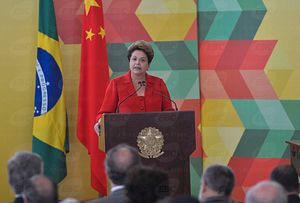Chinese Premier Li Keqiang arrived in Brazil yesterday, part of a broader tour of South America that includes stops in Colombia, Peru, and Chile. Li’s visit represents a continuation of China’s efforts to expand relationship with Latin American countries, particularly on the trade front. Li will be in Brazil from May 18-20.
While this is Li’s first visit to South America, President Xi Jinping visited Brazil, Argentina, Venezuela, and Cuba in July 2014 and made a trip to Latin America (visiting Trinidad and Tobago, Costa Rica, and Mexico) in June 2013. Since Xi came to power, China has also started an new dialogue platform with the Community of Latin American and Caribbean States (CELAC); Xi presided over the inaugural ministerial meeting in Beijing this January.
When it comes to South America, Brazil is particularly important for China. It’s China’s largest trading partner in all of Latin America. China and Brazil also have regular political contacts at the multilateral level, thanks to their inclusion in the BRICS grouping. From Beijing’s perspective, that makes Brasilia an important partner in the quest to remake the international order to provide more representation and influence for developing countries. As a sign of that partnership, Brazil lent its support to China’s Asian Infrastructure Investment Bank (AIIB), becoming the only country in the Americas to join as a founding member.
While China-Brazil relations have an important political component, this visit is largely focused on trade, as is the case for most of Li’s travels. As premier, Li is primarily tasked with sealing economic deals when he travels abroad, leaving the political aspects to President Xi. It’s interesting, then, that Xi has visited the broader Latin America region twice while Li is making his first trip — that suggests, as Xue Li pointed out in a recent article for The Diplomat, that Latin America is far down on the list of China’s economic priorities.
China-Brazil bilateral trade was worth $86 billion in 2014 — up only slightly over $83 billion in 2013. Slowing growth in trade ties can be chalked up to a number of factors. Brazil’s exports to China are mostly natural resources, a sector hard-hit by China’s economic slowdown and the current drop in demand for resources. Meanwhile, Brazil is facing its own economic woes, which have fostered greater concerns about a trade deficit with China. Brazilian tendencies toward protectionism have cut into Chinese exports of manufactured goods to Brazil.
To overcome these concerns, both countries are trying to leverage their trade relationship away from an over-reliance on Brazilian natural resources. They want to focus instead on “energy industry, equipment manufacturing, infrastructure, finance and the service sector,” according to Xinhua . During his visit, Li is expected to sign up to $100 billion in trade agreements in these sectors, centering on deals in infrastructure development, energy projects, and aviation.
Similar agreements were signed during Xi’s visit to Brazil last year. Highlights included a deal for Chinese airlines to purchase 60 passengers jets from Brazilian company Embraer and $5 billion in financing for the Brazilian mining firm Vale.
In particular, Chinese companies want to get a piece of Brazil’s plan to spend $65.8 billion in constructing and repairing highways and railways. Beijing also hopes this greater connectivity in Brazil will have a positive impact on trade between the two countries. China, Brazil, and Peru are continuing to investigate a possible railroad linking Brazil to Peru and thus the Pacific, providing easier passage for China-Brazil trade.

































